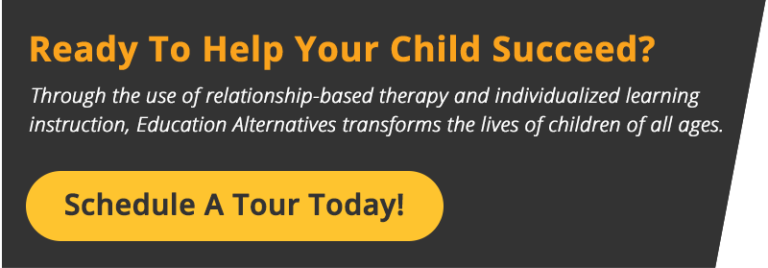
In March, the COVID-19 pandemic dramatically changed how most children and teens learn. The shift was difficult for most families, with parents scrambling to meet their children’s academic needs while working full-time and children coping with the loss of peer interaction and uncertainty.
For families with children on IEPs for emotional and behavioral challenges, the difficulties went beyond the typical. As weeks turned into months, parents and caregivers began noticing regression, loss of academic and social progress, and even new negative behaviors emerging as a response to stress.
Alternative schools like Education Alternatives, that provide different settings for students with intensive behavior needs, were faced with an unprecedented challenge: providing special education services that looked and felt like the personalized, compassionate, student-centered learning families had come to expect from in-person classrooms.
The New Normal
Fortunately, local infection rates often allow alternative schools with small class sizes to remain open. The pandemic can be difficult to predict and shifts to remote or hybrid learning can happen without warning. As a result, a clear mandate is emerging: special education providers need to invest in remote education and innovate to provide engaging, effective services even when students are temporarily off-site.
Intervention specialists know that this is a complex process. Typical online education requires students to move through material much more independently than in a physical classroom, to abandon established routines, and to effectively self-regulate by monitoring their own behaviors. Together with the stress of living through a period of intense uncertainty, keeping students and families on track and thriving takes a community of skilled, innovative, and flexible educators in partnership with mental health professionals.
The good news is that students are still entitled to free and appropriate public education, including fulfillment of their IEP, whether they are learning at home or at school.
The EA Approach
As the learning landscape changes, families and districts are increasingly opting for alternative schools to fulfill core requirements. At schools like EA, wraparound services like mental health support, group therapy, individual counseling, family counseling, and psychiatric services provide families with additional layers of support as they transition online.
As parents and caregivers step into the role of co-educators and notice new or changing behaviors, regular check-ins around mental wellness are transformative. These durable, varied, and effective lines of communication between school and home ensure parents always know who to call for support even when they’re offsite.
Struggling with online education? Here are some EA-educator-approved strategies for success when adapting to special education at home:
- Predictability and routines – EA schools have always used a philosophy of “safety, predictability, and fun.”Routines help students understand what’s coming next so they can focus on the moment. Try posting a schedule for the week somewhere prominent in your child’s learning area. Review it in the morning before school, then again at night when wrapping up homework to prepare for the next day.
- Connect with others virtually – Children and teens need peer support and access to their teachers to help motivate and redirect in real-time. Choose programs that offer a “synchronous” component where students are online together with an educator, over programs that are mostly self-directed or “asynchronous.” If your child is able, encourage them to ask questions about the content to keep class engaging. EA schools offer synchronous opportunities for both academic and mental health support.
- Opportunities for expression – Unstructured time is important. Children need time to get up, stretch, get the “wiggles” out, and create things “just for fun.” EA educators make sure to provide lots of purely fun, active time for students during the remote school day to combat screen fatigue, boredom, and frustration. If your child is having trouble focusing, a short break may be needed to get them back on track.
- Mental health support – Virtual learning can be isolating and overwhelming, particularly when the outside world feels uncertain. EA offers every student daily group therapy to teach and reinforce coping strategies with peers. Now is a key time to consider individual and even family counseling through REACH Behavioral Health. Counseling helps families and kids deal cooperatively with negative behaviors and brainstorm ways to bring more joy and calm to challenging times.
- Rewards –EA schools have always focused on positive reinforcement. By focusing on what your child is doing well, you can create new goals and reinforce existing ones in a way that fosters confidence, happiness, and motivation. While EA educators already provide classroom rewards for meeting goals, you might also consider offering a special treat, a favorite game, or other experience your child values as an incentive for positive behaviors. Your teacher can help you brainstorm what might be most effective and developmentally appropriate.
- Stock sensory items –When students are feeling overwhelmed, EA educators focus on grounding techniques. Anything that focuses attention on the moment rather than the emotion can be helpful. Consider weighted vests or blankets, calming bottles made from water and glitter glue, or molding clay to help your child pull back from tough moments. EA teachers can recommend low-cost, make-at-home sensory objects that will help your child de-escalate and return to safe behavior. Having these items accessible during the school day encourages positive coping and can be a fun project to create as a family.
Contact EA Today
Are you ready to learn more about remote education from Education Alternatives? To schedule a tour, complete our brief online intake assessment.
